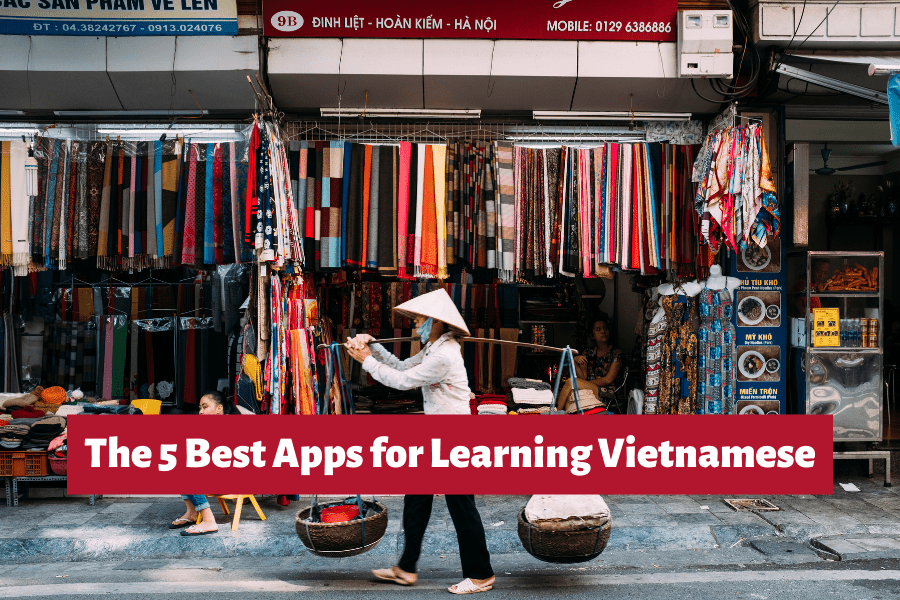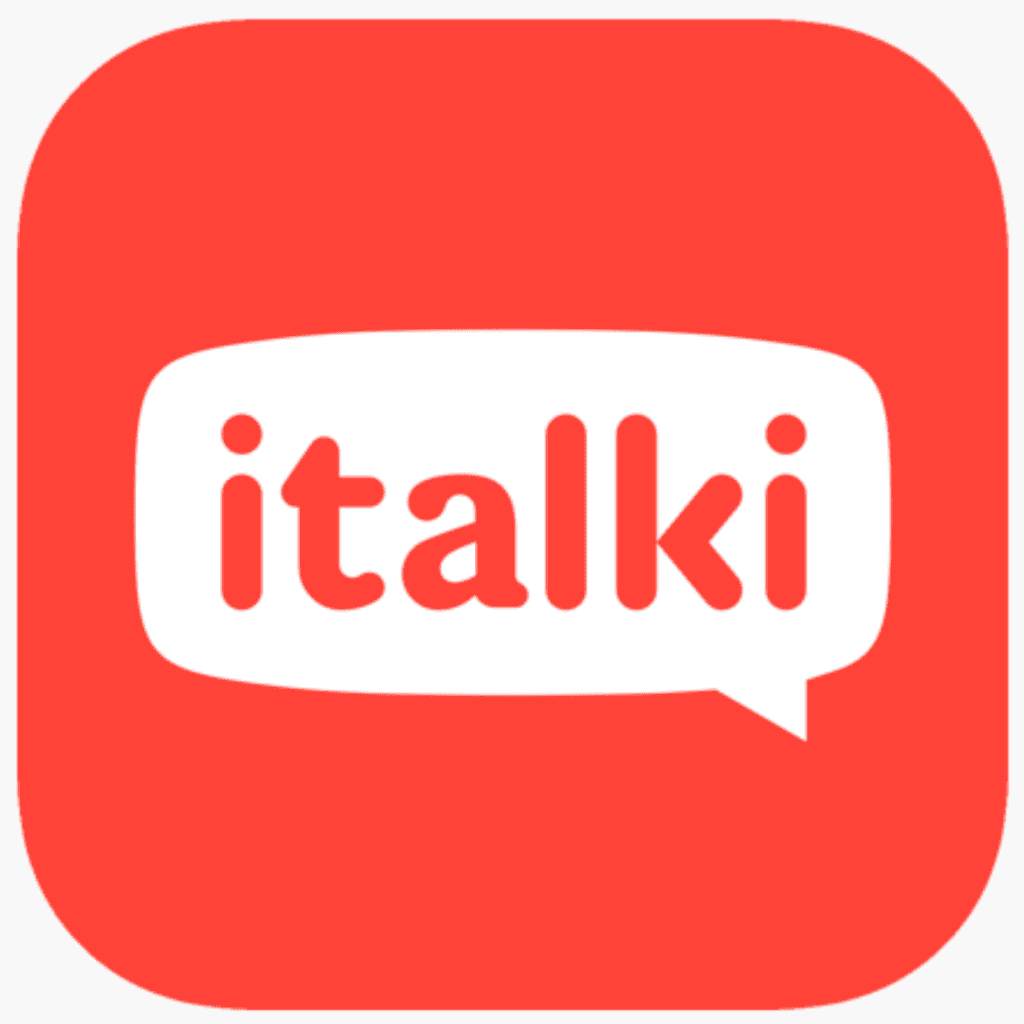- Editor's Choice
The most comprehensive app on the market. Highly engaging & varied content.
- 2nd Choice
A great option for beginners to learn basic vocab & phrases. Gamified & fun.
- 3rd Choice
Practice with native speakers with this affordable & flexible tutoring service.
Vietnamese is a notoriously difficult language to learn, with a complex system of grammar and 6 different tones to master, but don’t let that get you down. In this day and age there’s a myriad of research-based language learning tools that are structured to your needs, using modern techniques to break down the Vietnamese language in a way that’s easily digestible and fun!
There’s apps for learning daily conversation & dialogues, for memorizing the most common vocabulary, for intuitively learning how the grammar works, and to even to converse with real life native speakers! All this through the convenience of your smartphone or tablet.
In this article we’ve done the hard work for you and tested out all the most popular apps on the market (that we could find) and provided you with a condensed list of only the very best apps for learning Vietnamese. With the right tools and some time & effort, anything is possible.
So, without further ado, let’s dive right into the 5 best apps for learning Vietnamese.
Đi thôi! (‘Lets go!’)
Best Overall – Most Comprehensive
The winning app on our list is VietnamesePod101, a well established language program with it’s own dedicated app for learning Vietnamese. The lessons are predominantly video & audio lessons delivered by a variety of native tutors. They cover all sorts of topics from ordering food at a restaurant to Vietnamese customs and traditions. Many students love the cultural emphasis of this language app, with lots of cultural nuances being dropped in throughout the lessons, keeping it interesting and engaging throughout.
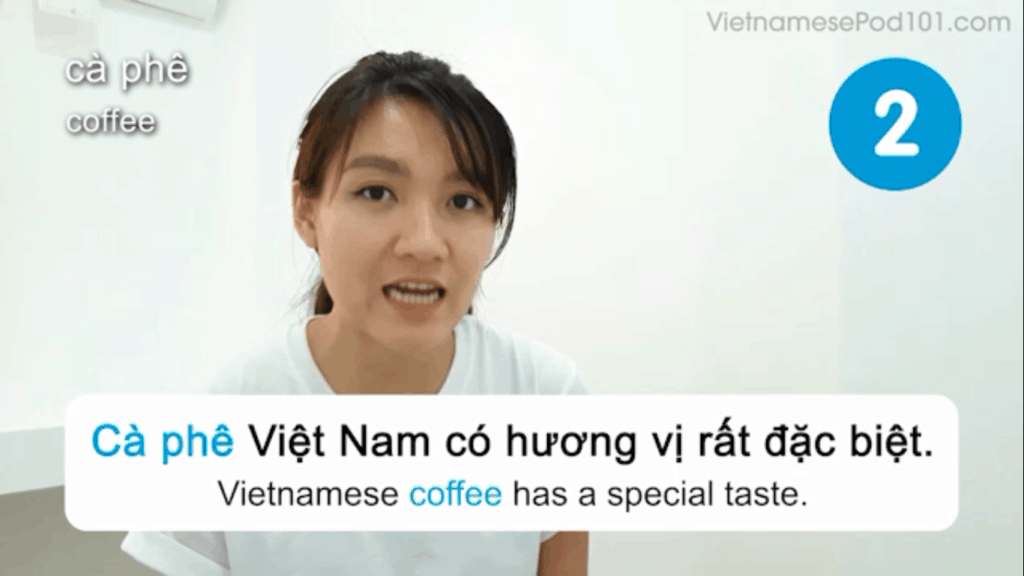
Alongside the lessons, you’ll be granted access to a whole range of extra learning tools that really help to supplement your learning. You can look things up in the grammar bank, save new vocabulary in your personal word bank or create a flashcard set. Plus, there’s frequency word lists and topical vocab lists to broaden your Vietnamese vocabulary.
Overall, there’s enough material to keep you engaged and progressing in the language for years to come, plus you can also snap up a nice discount by using one of our unique coupon codes (get up to 77% off).
Pros
- New content is being added all the time
- The tutors are really fun & engaging
- The app is very intuitive and easy to use
Cons
- The app doesn't provide enough speaking practice
- English is used too much at the lower levels
- The syllabus can feel a bit disorganised and unstructured
Price:
Effectiveness:
User Experience:
Most Engaging & Fun
Compared with other apps on this list, Memrise is like the new kid on the block. They use a similar teaching method to the more popular Duolingo, only far better. Firstly, with each lesson you’ll get an immersive experience into a real world dialogue with native speakers. The lessons then revolve around these short video clips, testing you on the meaning and pronunciation.
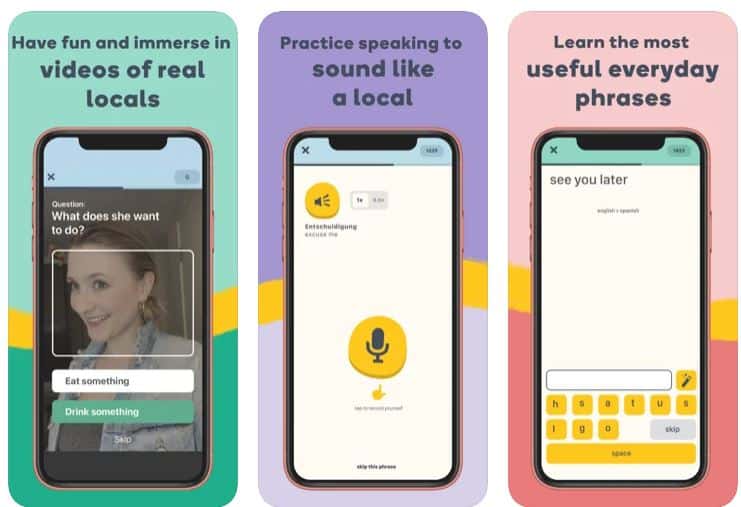
The only thing to bear in mind is that Memrise has now created a platform where other users can now create their own language courses. In many ways this is an awesome thing, allowing for much more varied topics such as ‘cool expressions’ and ‘basic pronunciation’, all included within the subscription. However, the quality does vary, and it’s not uncommon for errors and typos to creep into the lessons.
Pros
- Very engaging - videos of native conversations, broken down
- App interface works nicely
- Loads of useful content
Cons
- Mostly oriented for beginners
- Quality varies among the courses
- Quite expensive
Price:
Effectiveness:
User Experience:
Best Conversational App
One of the very best ways to learn any language is to get talking with locals as soon as possible, even if you can barely string together a sentence. Italki has revolutionised the way we now learn languages, granting us access to hundreds of professional native language tutors at an affordable price, from anywhere in the world. You can practice everything you’ve learnt and get instant corrections and speaking practice from your own smartphone.
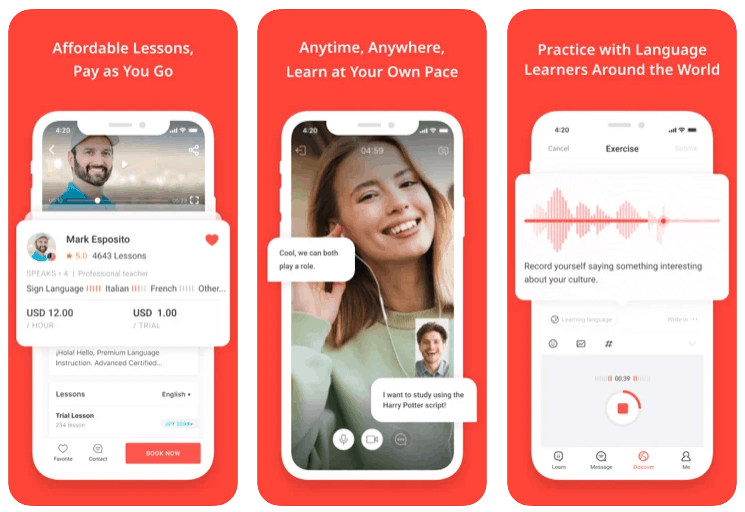
The process is simple, you find a tutor you like, book a trial lesson and get talking! Don’t worry if, like me, your an introvert who shivers at the thought of making idle conversation in broken Vietnamese. The tutors are always lovely people who have lots of conversational topics that are catered to your level. I recommend making best use of the learning program by making lots of notes, and expect lots of corrections!
Pros
- Built-in learning platform works seemlessly
- Wide variety of affordable tutors
- Build speaking confidence fast
Cons
- It can take a while to find a tutor you like
- Lessons can become disorganised without a strict plan & learning goal for each lesson
Price:
Effectiveness:
User Experience:
Most Effective App
Perhaps learning how to read and write in Vietnamese is not so important to you, and what you are looking for is only a basic conversation level of the language. For this, Pimsleur is your best bet. It uses modern & research based techniques to teach you how to speak Vietnamese with a native accent and understand what you hear.
The lessons are comprised of 30-60 minute audio podcasts that prompt you to repeat and respond to the native dialogue. It’s an immersive and thorough technique that systematically deconstructs each individual phrase, word & sound, and then reconstructs its all again, all whilst testing you on your understanding and fluency.
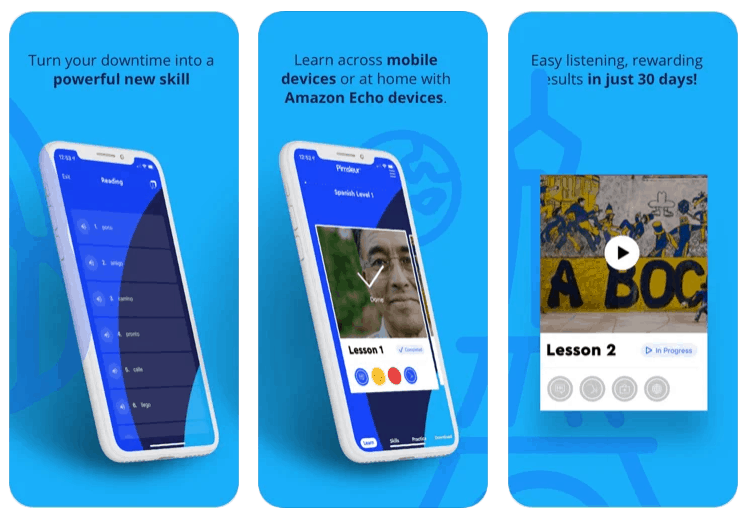
Pros
- Soley audio based
- Dialogues are authentic and practical
- Allows you to attain a basic conversational level of Vietnamese in a short amount of time
Cons
- Only speaking & listening (it doesn't cover ready or writing)
- The grammar is not explicitly taught
- It's expensive
Price:
Effectiveness:
User Experience:
Best Option for Beginners
Lingodeer is a great option that doesn’t seem to get the same amount of attention as the other more popular apps. It’s quite inexpensive, yet packs a punch. Starting with the Vietnamese alphabet the course will get you learning from a series of ‘mini-lessons’, each focused on a specific topic like ‘animals’ or ‘food’.

Generally, it’s not bad in it’s approach – it teaches full sentences and places appropriate focus on the pronunciation and grammar, but there’s not enough emphasis on speaking & listening (unlike Memrise, for example).
Pros
- Lesson topics are varied, with lots of exercise types
- Covers pronunciation & the Vietnamese alphabet early on
- Quite a lot of the content is free
Cons
- Not enough emphasis on oral communication skills
- The syllabus can seem illogical at times, with seemingly random words being taught early on in the course
Price:
Effectiveness:
User Experience:
Runners-up for Best Vietnamese App:
Here’s a few more apps for those looking for more options to study Vietnamese.
On a budget? Simply Learn Vietnamese might be your best bet. It contains thousands of useful phrases and vocabulary, grouped by topic and tested methodically through their spaced repetition system. Believe it or not, the app is actually free, funded only by advertising. Though it’s quite limited in terms of actual lessons, the vocab is very useful, and the audio is high quality which is definitely a plus.
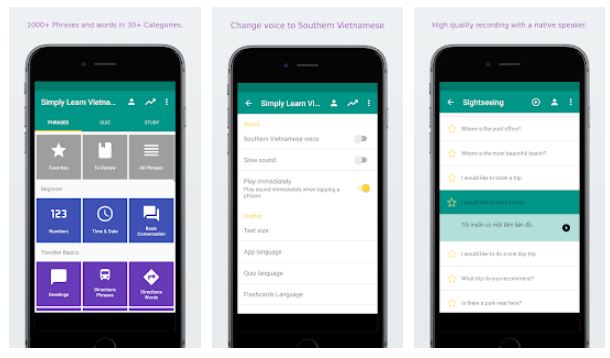
Pros
- Vocab is grouped into flashcard sets
- Lots of useful content
- It's free!
Cons
- The ads can get annoying
- Limited only to vocab - no grammar or speaking practice
- The interface is a bit clunky
Price:
Effectiveness:
User Experience:
Do you struggle to keep up the motivation for learning? Whilst it’s true there’s a lot of very effective apps that work effectively like Pimsleur & VietnamesePod101, sometimes it can be hard to keep up the daily study habit. This is where Ling excels.
Their app is packed full of fun & interesting features that are specifically designed to keep you hooked on learning more. You earn virtual bananas as you navigate each level, completing quizzes, games & even communicating with chatbots! (You can select pre-set phrases for a dialogue to review what you’ve learnt).
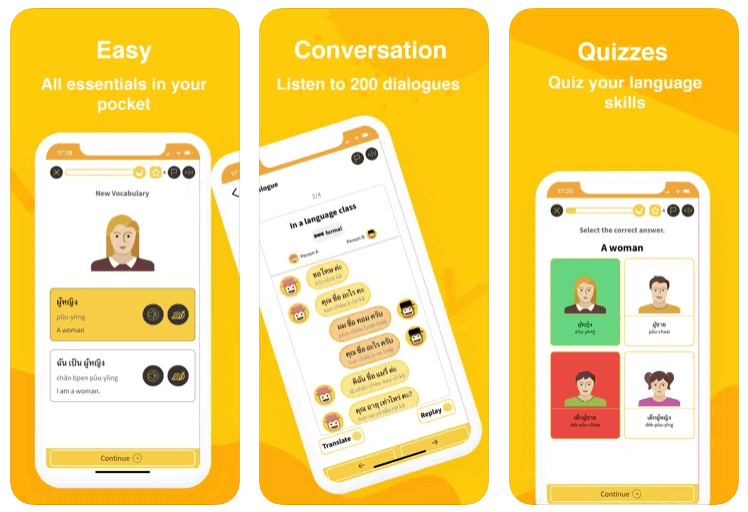
Pros
- The app is fun & easy to use
- Variety of different games & activities to play
- The app tracks your daily streak, your progress and allows you to compete with friends
Cons
- The pro version is quite expensive
- It's focused mainly on beginners
- Not enough in-depth grammar explanations
Price:
Effectiveness:
User Experience:
Ever thought about programming your brain to be in tune with the Vietnamese language by ‘working out’ your brain in the same way you would do at the gym? No? Just me then… Glossika is based upon this exact concept – by completing daily ‘reps’ and teaching your brain to intuit the Vietnamese grammar and to daily train your vocal muscles to sound like a native speaker.
After completing a short placement test the app will feed you a series of sentences that systematically expose you to new words, sentence structures & sounds. It then proceeds to test you on them with a spaced repetition system & feed the results into the AI algorithm.
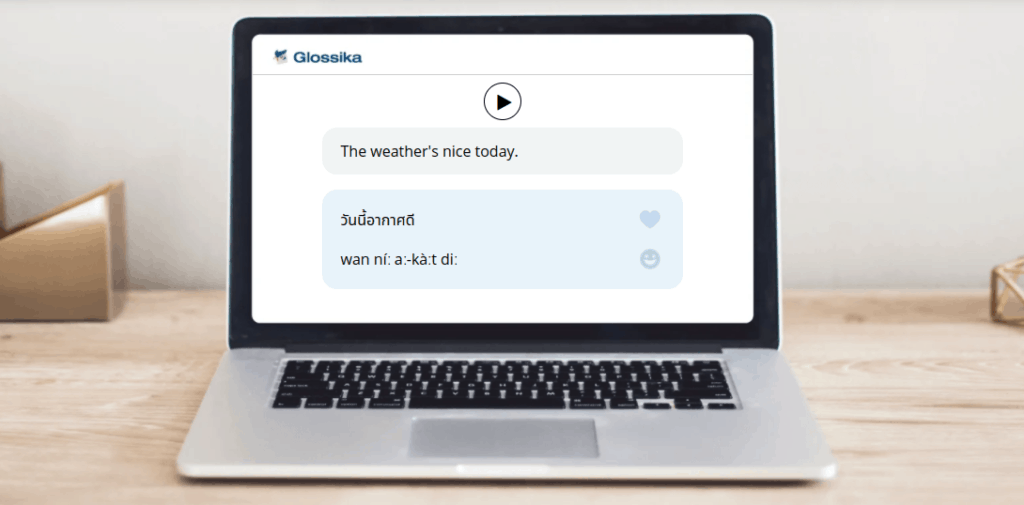
Pros
- A subscription gives you access to over 60 languages
- Based upon a proven learning method
- Massively boosts listening and speaking skills
Cons
- It can get quite boring after a while
- Not all sentences are the most practical or useful
- No mobile app - only accessed through a web browse
Price:
Effectiveness:
User Experience:
Conclusion: The 5 Best Apps For Learning Vietnamese
Which ones do you think are the best apps for learning Vietnamese? Let us know in the comments below!
At the end of the day, everyone has their own learning preferences and study techniques. You can’t really go wrong with our list of best Vietnamese apps. To recap:
For affordable speaking practice with native speakers we recommend italki. For those who prefer a more gamified style of learning we recommend Memrise or Ling.
And finally, our best overall app for it’s quality of content & range of learning tools and video/podcast lessons, has to be VietnamesePod101.
Have fun learning and good luck!

Josiah is a digital nomad with a passion for language learning and adventure travel. He’s taught English as a foreign language for many years and is currently learning Georgian, French and Chinese.
